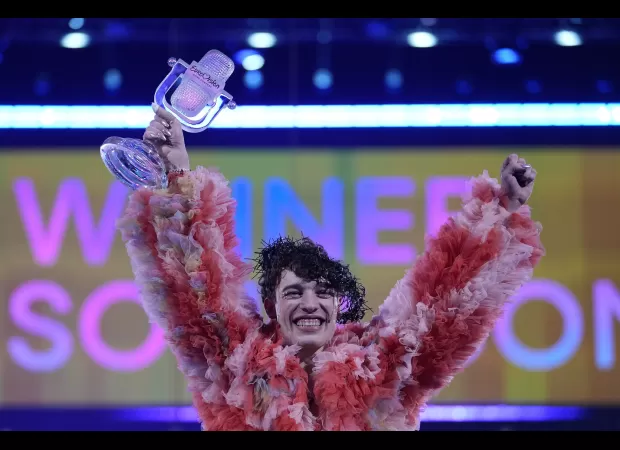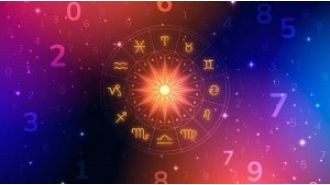Switzerland's Nemo takes home Eurovision Song Contest victory.
Swiss singer Nemo won Eurovision with The Code, an operatic pop-rap about their journey to accepting their nongender identity.

In a stunning and historic moment, Swiss singer Nemo has emerged victorious as the winner of the 68th Eurovision Song Contest with their operatic pop-rap masterpiece, The Code. This moving and powerful ode takes listeners on a journey through Nemo's personal struggles and ultimate embrace of their nongender identity.
Nemo's triumph was hard-earned, as they faced fierce competition from Croatia's Baby Lasagna, ultimately winning over the hearts of national juries and viewers worldwide. This monumental win also marks a significant milestone, as Nemo becomes the first nonbinary contestant to take home the coveted title in the contest's 65-year history.
Filled with gratitude and emotion, Nemo graciously accepted the honor, saying, "Thank you so much. I hope this contest can continue to uphold its promise of standing for peace and dignity for every person." It was a poignant reminder of the Eurovision's mission to unite people through the universal language of music.
Nemo's victory in the Swedish city of Malmo comes after a tumultuous year for the beloved pan-continental competition. In the midst of the ongoing war in Gaza, the participation of Israel sparked large street protests that threatened to overshadow the feel-good celebration. And just hours before the final, Dutch competitor Joost Klein was expelled from the contest due to a backstage altercation that was being investigated by police.
But despite the challenges, Nemo rose above 24 other talented finalists from around the world. Each contestant had three minutes to captivate the live audience and an estimated 180 million viewers with their unique blend of catchy tunes and eye-popping spectacle. From rock to disco, techno to rap, and everything in between, the diverse musical styles and performances kept audiences on the edge of their seats.
Returning to the birthplace of last year's winner Loreen, Sweden once again played host to the dazzling showcase of talents. And while the iconic ABBA was unable to make a physical appearance, their digital "ABBA-tars" from the ABBA Voyage stage show made a special appearance. Additionally, a trio of former Eurovision champions, including Charlotte Perrelli, Carola, and Conchita Wurst, took the stage to perform ABBA's iconic hit, "Waterloo," as the votes were being tallied.
From identical twins Marcus and Martinus opening the competition with their infectious song "Unforgettable," to Ukrainian duo alyona alyona & Jerry Heil's powerful tribute to their war-torn country, and Germany's emotional ballad by Isaak and Luxembourg's soulful performance by Tali, the night was filled with a diverse and eclectic mix of talents.
But it was Israel's Eden Golan who captured the attention of many, despite facing a wall of both boos and cheers as she took the stage to perform her power ballad "Hurricane." And while she ultimately placed fifth in the competition, Golan's journey to the stage was not without controversy. Eurovision organizers ordered a title change to her song, "October Rain," which was perceived as a reference to the October 7 Hamas attack that sparked the war in Gaza.
The Eurovision Song Contest is known for its eccentric and often campy performances, and this year was no exception. Lithuania's Silvester Belt charmed audiences with his affable demeanor and smooth vocals, while Estonia's 5Miinust x Puuluup offered a unique pop-zombie folk hybrid with the traditional talharpa stringed instrument.
Greece's Marina Satti and Armenia's Ladaniva seamlessly blended folk song and dance elements with power pop, while the UK's own Olly Alexander brought his signature upbeat dance track, "Dizzy," to the stage. And let's not forget Finland's eccentric Windows95man, who emerged from a giant egg on stage wearing very little clothing, or Ireland's gothic Bambie Thug, who summoned a demon and even brought a scream coach to Malmo.
But beyond the music and spectacle, this year's Eurovision has been mired in controversy and division. Protests and dissent overshadowed the celebration, with thousands of pro-Palestinian demonstrators taking to the streets to demand a boycott of Israel and a cease-fire in the ongoing Gaza war. And as tension and nerves ran high, Dutch performer Joost Klein was ejected from the competition following a backstage incident that was captured on camera without his consent.
Despite the challenges and tumultuous events leading up to the final, the night was ultimately a celebration of unity and love through music. As French singer Slimane so poignantly stated during the final dress rehearsal, "We must be united by music, yes, but with love and for peace." And while some artists used their performances to make a statement about world events, others simply wanted to spread joy and positivity through their music.
In the end, it was Nemo's powerful and moving performance that captured the hearts of viewers and secured their place in Eurovision history. As last year's champion Loreen reminds us, "What heals trauma... Does trauma heal trauma? Does negativity heal negativity? It doesn't work like that. The only thing that heals trauma for real - this is science - is love." And through their music and message of acceptance, Nemo embodies the true spirit of Eurovision.






